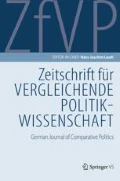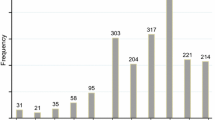Abstract
Based on responses to the Afrobarometer and other surveys, it appears that most Africans believe their country is democratic. Oftentimes they even express satisfaction with the degree of democracy. Experts, however, have shown that many African countries have a flawed democracy or an authoritarian regime. This discrepancy raises questions about trying to measure democracy based on people’s perceptions and what these perceptions actually indicate. The current study’s analyses (multi-level modelling) based on Afrobarometer (wave 5) indicate that the nature of an individual’s orientation towards the state (‘rights seeker’ vs. ‘privilege seeker’) can contribute to that individual’s belief in the existence of democracy and satisfaction with that perceived democratic governance. This orientation functions as a layer of belief that can affect the cognitive system used to evaluate a political system. When comparing rights seekers’ and privilege seekers’ responses, the rights seekers are more demanding and have higher standards for personal freedom and political liberty. Consequently, there are variations in the perception of the degree of democracy. Given that the majority of respondents to the Afrobarometer have a privilege seeking nature, this may affect the survey results on questions about democracy. The study explores further mechanisms relating to the possible effects of an individual’s orientation towards the state. It finds that privilege seekers tend to believe their country has less corruption and less unequal treatment than rights seekers do. Furthermore, privilege seekers award higher scores on government performance indicators such as ‘management of economy’ and ‘reduction of crime’ than do right seekers.
Zusammenfassung
Befunde des Afrobarometers und anderer Umfragen zeigen, dass die meisten afrikanischen Bürger ihr jeweiliges Land für demokratisch halten. Häufig sind sie sogar zufrieden mit dem Grad der Demokratie. Demgegenüber kommen Experten zu der Einschätzung, dass viele afrikanische Länder als defizitäre Demokratien oder autoritäre Regime klassifiziert werden können. Diese Diskrepanz wirft die Frage auf, ob man versuchen sollte, Demokratie auf der Grundlage der Wahrnehmung der Menschen zu messen, und was diese Wahrnehmung tatsächlich aussagt. Die Mehrebenenanalyse der aktuellen Studie, die auf Daten der fünften Welle des Afrobarometers basiert, deutet darauf hin, dass die Art des individuellen Staatsverständnisses („Rechtsuchende“ vs. „Privilegiensuchende“) dazu beiträgt, den Glauben an die Existenz von Demokratie sowie die Zufriedenheit mit der wahrgenommenen demokratischen Regierungsführung zu erklären. Diese politische Orientierung fungiert als Teil des Einstellungssystems, das zur Bewertung eines politischen Systems verwendet wird. Wenn man die Antworten von Rechtsuchenden mit denen der Privilegiensuchenden vergleicht, zeigt sich, dass die Rechtsuchenden anspruchsvoller sind und höhere Anforderungen an die persönliche und politische Freiheit stellen. Folglich gibt es Unterschiede in der Wahrnehmung des Demokratiegrads. Da die Mehrheit der Befragten des Afrobarometers ein privilegiensuchendes Verständnis aufweist, kann sich dies auf die Umfrageergebnisse zu Fragen der Demokratie auswirken. Die Studie untersucht zudem weitere Mechanismen im Zusammenhang mit dem Staatsverständnis des Einzelnen. Hier kommt sie zu dem Ergebnis, dass Privilegiensuchende dazu neigen, zu glauben, ihr Land habe weniger Korruption und weniger Ungleichbehandlung als Rechtsuchende. Darüber hinaus vergeben Privilegiensuchende bei den Leistungsindikatoren der Regierung, wie z. B. „Management der Wirtschaft“ und „Verringerung der Kriminalität“, höhere Werte als Rechtsuchende.
Similar content being viewed by others
References
Ariely, Gal, and Eldad Davidov. 2011. Can we rate public support for democracy in a comparable way? Cross-national equivalence of democratic attitudes in the World Value Survey. Social Indicators Research 104(2):271–286.
Baniamin, Hasan Muhammad. 2019. Linking socio-economic performance, quality of governance, and trust in the civil service: does culture intercede in the perceived relationships? Evidence from and beyond Bangladesh, Nepal and Sri Lanka. Asia Pacific Journal of Public Administration 41(3):127–141.
Baniamin, Hasan Muhammad, Ishtiaq Jamil, and Steinar Askvik. 2019. Mismatch between lower performance and higher trust in the civil service: Can culture provide an explanation? International Political Science Review 41(2):192–206.
Bratton, Michael, and Richard Houessou. 2014. Demand for democracy is rising in Africa, but most political leaders fail to deliver. Afrobarometer Policy Paper #11.
Bratton, Michael, and Robert Mattes. 2001. Support for Democracy in Africa: intrinsic or instrumental? British Journal of Political Science 31(3):447–474.
Bratton, Michael, Philip Alderfer, Georgia Bowser, and Joseph Temba. 1999. The effects of civic education on political culture: evidence from Zambia. World Development 27(5):807–824.
Bratton, Michael, Robert Mattes, and Emmanuel Gyimah-Boadi. 2005. Public opinion, democracy, and market reform in Africa. Cambridge: Cambridge University Press.
Canache, Damarys, Jeffery J. Mondak, and Mitchell A. Seligson. 2001. Meaning and measurement in cross-national research on satisfaction with democracy. Public Opinion Quarterly 65(4):506–528.
Chabal, Patrick, and Jean-Pascal Daloz. 2006. Culture troubles: politics and the interpretation of meaning. Chicago: University of Chicago Press.
Dahl, Robert. 1992. The problem of civic competence. Journal of Democracy 3(4):46.
Dalton, Russell J., and Nhu-Ngoc T. Ong. 2005. Authority orientations and democratic attitudes: a test of the ‘Asian values’ hypothesis. Japanese Journal of Political Science 6(2):211–231.
Democracy matrix. 2018. Levels of measurement and regime typology of the democracy matrix. https://www.democracymatrix.com/ranking. Accessed 29 May 2020.
Democracymatrix. 2020. Levels of measurement and regime typology of the democracy matrix. https://www.democracymatrix.com/conception/measurement-levels-regime-typology. Accessed 29 May 2020.
Inglehart, Ronald. 1997. Modernization and postmodernization: cultural, economic, and political change in 43 societies. Princeton: Princeton University Press.
Inglehart, Ronald. 2000. Culture and democracy. In Culture matters: how values shape human progress, ed. Lawrence E. Harrison, Samuel P. Huntington, 80–97. New York: Basic books.
Inglehart, Ronald. 2003. How solid is mass support for democracy—and how can we measure it? Political Science & Politics 36(1):51–57.
Inglehart, Ronald, and Wayne E. Baker. 2000. Modernization, cultural change, and the persistence of traditional values. American sociological review 65(1):19–51.
Inglehart, Ronald, and Christian Welzel. 2005. Modernization, cultural change, and democracy: the human development sequence. Cambridge: Cambridge University Press.
Keulder, Christiaan, and Tania Wiese. 2005. Democracy without democrats? Results from the 2003 afrobarometer survey in Namibia. Afrobarometer Working Paper No. 47.
Lindgren, Karl-Oskar, and Thomas Persson. 2011. In Participatory Governance in the EU. London: Palgrave Macmillan.
Lynch, Gabrielle, and Gordon Crawford. 2011. Democratization in Africa 1990–2010: an assessment. Democratization 18(2):275–310.
Ma, Deyong, and Feng Yang. 2014. Authoritarian orientations and political trust in East Asian societies. East Asia 31(4):323–341.
Mamdani, Mahmood. 1996. Citizen and subject: contemporary Africa and the legacy of late colonialism. New Jersy: Princeton University Press.
Mäntysalo, Raine, Inger-Lise Saglie, and Göran Cars. 2011. Between input legitimacy and output efficiency: defensive routines and agonistic reflectivity in Nordic land-use planning. European Planning Studies 19(12):2109–2126.
Meikle-Yaw, Paulette. 2008. Democracy satisfaction: the role of interpersonal trust. Community Development 39(2):36–51.
Mouffe, Chantal. 2000. The democratic paradox. New York: Verso.
Norris, Pippa. 2011. Democratic deficit: critical citizens revisited. New York: Cambridge University Press.
Rose, Richard. 2007. Learning to support new regimes in Europe. Journal of Democracy 18(3):111–125.
Rothstein, Bo. 2009. Creating political legitimacy: electoral democracy versus quality of government. American behavioral scientist 53(3):311–330.
Rothstein, Bo O., and Jan A.N. Teorell. 2008. What is quality of government? A theory of impartial government institutions. Governance 21(2):165–190.
Schaffer, Frederic Charles. 2000. Democracy in translation: understanding politics in an unfamiliar culture. Ithaca: Cornell University Press.
Scharpf, Fritz W. 1997. Economic integration, democracy and the welfare state. Journal of European public policy 4(1):18–36.
Schmidt, Vivien A. 2013. Democracy and legitimacy in the European Union revisited: Input, output and throughput. Political Studies 61(1):2–22.
Shi, Tianjian. 2001. Cultural values and political trust: a comparison of the People’s Republic of China and Taiwan. Comparative Politics 33(4):401–419.
Shin, Doh Chull. 2016. Western theories versus East Asian realities: political system preferences among East Asians. Irvine: Center for the Study of Democracy.
Transparency International (TI). 2015. Corruption perception index (CPI). https://www.transparency.org/cpi2018. Accessed 24 Sept 2018.
UNDP (United Nations Development Programme). 2015. Human development report 2015—work for human development. New York: United Nations Development Programme.
Wang, Zhengxu, and Yu You. 2016. The arrival of critical citizens: decline of political trust and shifting public priorities in China. International Review of Sociology 26(1):105–124.
Weiler, Joseph H.H. 2012. In the face of crisis: input legitimacy, output legitimacy and the political messianism of European integration. Journal of European integration 34(7):825–841.
Welzel, Christian, and Russell Dalton. 2017. Cultural change in Asia and beyond: from allegiant to assertive citizens. Asian Journal of Comparative Politics 2(2):112–132.
Welzel, Christian, and Ronald Inglehart. 2008. The role of ordinary people in democratization. Journal of democracy 19(1):126–140.
Author information
Authors and Affiliations
Corresponding author
Ethics declarations
Conflict of interest
H.M. Baniamin declares that he has no competing interests.
Appendix
Appendix
Rights and permissions
About this article
Cite this article
Baniamin, H.M. Citizens’ inflated perceptions of the extent of democracy in different African countries: are individuals’ notions of the state an answer to the puzzle?. Z Vgl Polit Wiss 14, 321–343 (2020). https://doi.org/10.1007/s12286-020-00466-1
Received:
Revised:
Accepted:
Published:
Issue Date:
DOI: https://doi.org/10.1007/s12286-020-00466-1






